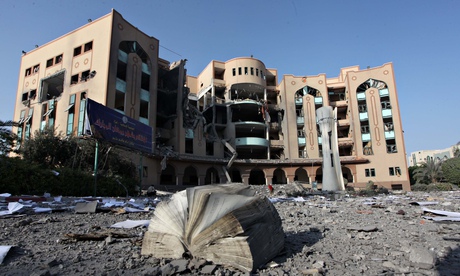
Middle Eastern politics is a sensitive subject, and nowhere more so than in the ongoing conflict in Gaza, which is why it is important to emphasise from the outset that the views in this piece are mine and mine alone.
The focus of my work is higher education but this is just one small element of the learning that everyone should be free to undertake because, simply, education is a birthright.
Whatever a person’s background, class, race, gender or religion, they should have the basic right to fulfill their potential. I, like many people, have had my life transformed by education, and remember very well the teachers who recognised potential in me and taught me to recognise it in myself.
Almost the entire Palestinian population is denied the basic right of education, a direct result of the continuing colonisation and occupation of Palestine by Israel. Even before the recent Israeli war on Gaza inflicted unprecedented destruction and carnage, life for Palestinians was a sort of subnormality.
They now face years, if not decades, before returning to those deeply unsatisfactory levels, and for the restoration of the shattered institutional infrastructure needed to support their right to education.
Israel’s attitude towards education has in many ways been highly progressive. The Zionist movement established educational institutions as a fundamental basis of building a nation – long before the state of Israel came into being. The Israel Institute of Technology, a public research university in Haifa, was established in 1912, followed by the Hebrew University in Jerusalem in 1925.
In 2012 Israel was ranked by the Organisation for Economic Cooperation and Development as the second most educated country in the world. It is a position to be proud of, yet it is completely at odds with the restricted right for Palestinians to participate in education, and advance their own nation building through learning institutions.
In 2007 the University and College Union voted to boycott Israeli universities for their support of the occupation of Palestine. It was and is an important signal to Israel, indicating that the world refuses to accept its violation of international law and of basic human rights.
Before 1967 Palestinian universities did not exist in the West Bank and Gaza. Most students wanting a university education joined neighbouring Arab universities in Jordan, Egypt, Syria, Lebanon and Iraq, among others.
The subsequent development of universities in the West Bank and Gaza has since been fraught with difficulty, including restrictions imposed by the Israelis at the outset. Universities were granted annual licences to conduct education by Israel, which kept a close watch on how Palestinians were delivering education.
Following the Oslo Accords in 1993 and 1995, education was transferred to the Education Authority of the Palestinian National Authority, yet not without the imposition of several additional restrictions by Israel. For example, core subjects such as the history of the Zionist movement, the history of Palestinian resistance, cultural studies of Palestine and others have been withdrawn, restricting Palestinians in understanding their own past and that of Israel.
There are further curriculum limitations on subjects such as engineering and science, as well as those involving research into materials science, product and industrial design and other mechanical and electronic engineering.
Today there are around 213,000 higher education students in Palestine, studying in 49 institutions. Most of those universities suffer from insufficient funding to operate effectively. Between 60 and 70% of university budgets are covered by student tuition fees – restricting access to those from poorer backgrounds – and the rest through funding from the European Union, the US and others.
Negligible funding is available for research and development, while poorly paid academic staff are forced to take second jobs, reducing their ability to deliver high quality teaching.
In the wake of the bombardment, Gaza’s 500,000 schoolchildren face a bleak start to a new academic year. Of 420 schools, 200 have been turned into refugee shelters, 25 have been completely destroyed and another 230 damaged, some of them so badly they will not be ready for September. Over 20 teachers were killed.
One of the three main universities in Gaza, the Islamic University, has been destroyed and the other two severely damaged.
Despite the continuing military pressure, university students and academics are determined to sustain their academic activities but the odds against them are frequently insurmountable.
This conflict serves the interests of no one, including university students in Israel. It may be a small consideration by comparison but their diminished access to international visitors able to broaden their education and their insights into world affairs is a loss – and another barrier to the mutual understanding needed.
Education is a right, regardless of the actions of any military protagonist, but in Gaza and for Palestinians generally, it is one that has been completely crushed. Its damaging legacy will continue well after the current conflict subsides and will further postpone any real chance of a lasting peace.
Professor Bashir Makhoul is pro vice-chancellor at Birmingham City University.
Join the higher education network for more comment, analysis and job opportunities, direct to your inbox. Follow us on Twitter @gdnhighered.






